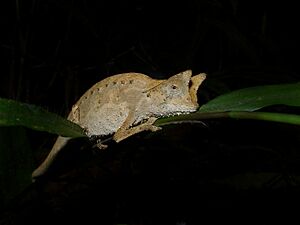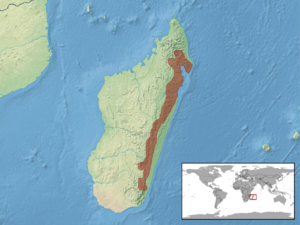Brown leaf chameleon facts for kids
Quick facts for kids Brown leaf chameleon |
|
|---|---|
 |
|
| Conservation status | |
| Scientific classification | |
| Genus: |
Brookesia
|
| Species: |
superciliaris
|
 |
|
The brown leaf chameleon (also called the stump-tailed chameleon) is a tiny lizard. Its scientific name is Brookesia superciliaris. You can find it along the eastern coast of Madagascar and on the island of Nosy Boraha. This chameleon looks a lot like a dead leaf, which helps it hide!
Contents
Appearance and Features
The brown leaf chameleon has a long, flat body. It looks just like a rolled-up, dead leaf. These chameleons come in many colors. They can be brown, beige, grey, olive green, or even dark red. But they always have colors and patterns that help them blend in with dead leaves.
Even though it's small, this chameleon looks quite impressive. It has two noticeable horns above each eye. It also has four spiky scales sticking out from its throat.
Where it Lives and What it Likes
The brown leaf chameleon lives in eastern Madagascar. This includes the island of Nosy Boraha. You can find them from sea level up to over 1,250 meters (4,100 ft) high.
They prefer the floor of evergreen primary forest (old, untouched forests). But they can also live in secondary forest (forests that have grown back) and nearby overgrown farms. They seem to like forests with a thick, closed-off tree canopy. Unlike some other Brookesia chameleons, they often climb higher in the forest, sometimes up to 1.5 meters (5 ft) off the ground.
How it Lives and Acts
During the day, the brown leaf chameleon searches for food among dead leaves on the forest floor. It uses its eyes, which can move separately, to spot prey. Then, it catches insects with its long, sticky tongue.
If it feels threatened, its first move is to stay perfectly still. It relies on its amazing camouflage to disappear. But it has other tricks too! One cool trick is the 'freeze-and-roll' technique. The chameleon pulls its legs under its belly, rolls onto its side, and stays very still. This makes it look exactly like a dead leaf on the ground. It can also push out its spines to scare away animals that want to eat it.
Reproduction and Life Cycle
Brown leaf chameleons have an interesting way of finding a mate. A male will approach a female by nodding and rocking his head. If the female isn't interested, she will move away quickly. But if she is ready to mate, she will walk with the male.
This species can store sperm after mating. About 30 to 45 days later, the female lays two to five eggs. She hides them under dead leaves, moss, or pieces of bark on the forest floor. Sometimes, she digs a small nest in the ground for her eggs. The eggs hatch after 59 to 70 days. Young brown leaf chameleons become adults and can have their own babies within one year.
Threats and Protection
Like other Brookesia chameleons, the brown leaf chameleon faces dangers. The biggest threat is habitat destruction. This happens when forests are cleared for farming, cutting down trees for wood, or small-scale mining.
People do collect these chameleons for the international pet trade. However, this is not thought to be a major threat to their survival. Since 2005, there's a limit on how many can be exported each year (200 chameleons).
The brown leaf chameleon is listed on Appendix II of the Convention on International Trade in Endangered Species (CITES). This means that trading this species must be carefully controlled. This helps make sure they can survive in the wild.
These chameleons also live in several protected areas. These include Befotaka-Midongy National Park, Mantadia National Park, Analamazoatra Special Reserve, and Kalambatitra Special Reserve. Even though illegal logging and other activities can still harm these forests, this chameleon can handle some changes to its home better than other leaf chameleons.


